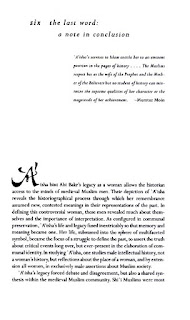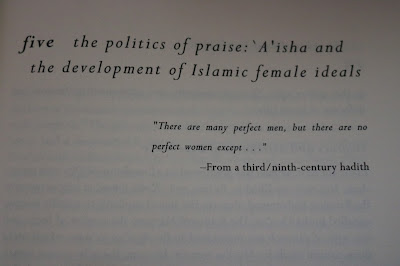BOOK:Politics, Gender and the Islamic Past: The Legacy of ‘Ā’isha bint Abī Bakr
‘Ā’isha b. Abī Bakr (d. 678)
Reference: Denise Spellberg’s excellent book entitled Politics, Gender and the Islamic Past: The Legacy of ‘Ā’isha bint Abī Bakr (1996).
Title : Politics, Gender and the Islamic Past: The Legacy of ‘Ā’isha bint Abī Bakr
Writer : Denise Spellberg
Western Perspectives
Year : 1996
Type : Reviewers
MY SUMMARY
Learning from this book, a western perspective:
Aisha is a well-known favourite and intelligent of the wife of the Prophet. She narrated a lot of hadits, particularly for the Sunni traditions.
Aisha is also a well-known leader for the battle of Camel, for the political opposition of the third and fourth Caliph, Usman Bin Affan and Ali ibn Abi Thalib.
I also learn about a trial for Aisha. The issue (gossip) or accusation of her adultery with Safwan Ibn Al-Mu’attal Al-Sulami was spread across Medina. She did not ask permission to leave her camel due to personal concern (“private business”), she lost her groups night when return from a raid against Musta’liq tribe. Then, Safwan offered his camel to her and accompanied her to the Medina. Unfortunately, when she arrived in Medina, gossip about ‘adultery’ has spread across Medina. I learn how a notion of honor, and shame of Aisha- as a married Muslim woman in non-Islamic culture in Mecca at that time (before Fathu Mecca) and walked with non-mahram, unfortunately, this accident invited rumors of an assignation or fitnah. Aisha was just like other women who fell sicker after knowing the gossip and she pray to Allah because her husband, the Prophet even asked her about that day. Although, at the end, her dignity was proven, and she was still the one who was accompanied the Prophet in his deathbed.
Aisha was also an example of non-blood lineage marriage within non-Islamic Mecca at that time which maintained the importance of family lineage by getting married of one of their closes family.
The secret of getting married Aisha in her young age at 9 years (at that time it was common to get married after the first menstruation for cultural Arab) with her intelligent and smartness.
After the death of the Prophet, Aisha was one as a political woman, a daughter of Abu Bakr As Sidq, the favorite wife of The Prophet.
Interestingly, “Sunni and Shi’a authors argued over the proper role of the prominent widow but also often spoke from the same concern-that women in positions of influence could do only harm to the socio-political and moral order”.
(GOT THE BOOK FROM MONASH UNI YEAY)
Refleksi:
SeJArah Note:
Membaca kisah Aisya RA versi Outsider, membuat saya terbelanga dan mulai sedikit paham kenapa mereka tidak suka The Prophet, menganggap Al Qur'an itu karangan the Prophet. Kisah Aisyah yang tertinggal dari rombongan, menjadi gossip hangat dan cemoohan tentang the Prophet, masa utusan Tuhan istrinya begini dan menjadi debu tajam perpecahan ummat menjadi Sunni dan Shi'ih....Apalagi posisi the Prophet klu kita bilang kayak presiden ya saat itu atau pejabat politik penting...
Tetapi si doi tetap menjelaskan dan membandingkan sosok Aisyah yang di fitnah dg para wanita lain di kitab suci lainnya..seperti Suzanna, dan turunnya bantuan Tuhan, untuk menjaga kesucian para perempuan, Terlepas ada yang percaya atau tidak...
Uniknya beliau juga mengkaji bagaimana sosok Aisya RA, sebagai istri the Prophet, dan anak Khalifa Abu Bakr, memiliki kekuatan politikk kuat sebagai wanita timur tengah itu dan berhasil memenangkan Perang Unta pertama. Beliau dhargai sebagai istri terfavorit the Prophet, Ibu para umat, disatu sisi beliau djatuhkan lawan politik karena status sosial beliau sebagai seorang Janda....
Lalu akhirnya mundur karena mulai paham bahwa fitna bertebaran yang membuat mereka bertikai dg Ali bin Abu Thalib dan menfokuskan diri pada ilmu pengetahuan dan mengajar hingga usianya wafat di umur 70an....Dan dia memilih menjadi "Single" tanpa menikah kembali setelah ditinggal wafatnya The Prophet pada usia belianya 17 tahun. Dan ilmunya menjadi salah satu bekal kita sekarang...
#Salut sang penulis sangat fasih berbagai bahasa termasuk bahasa Arab dan sumber referensi yang Wow aj#
Buku dikirim jauh dari Monash Uni#Terimakash bimbingannya..my love#Buat keriting#
Politics, gender, and the Islamic Past: The legacy of Aisha bint Abi Bakr
Politics, gender, and the Islamic Past: The legacy of Aisha bint Abi Bakr
IMPORTANT QUOTATION FROM PREVIOUS REVIEWS
1. Review by Suzanne Marchant- Amman
The persona of A’isha, beloved wife of the Prophet of Islam, Muhammad, and daughter of his closest friend, trustee and counsellor Abu Bakr al-Siddiq.
She is one of the few women who for over 1400 years has been of great significance to all Muslims, male and female
Professor Spellberg states that Aisha was born and raised (p.3) in an Islamic environment. This was not the case. Aisha was born in Mecca but at a time when the environment was in complete contradiction to the teachings of Islam. While her private life may have been directed solely by Islam, the general environment in which she lived in Mecca, and which affected all other parts of her life, was clearly non-Islamic. (Chapter 1)
Aisha genealogy, the importance of her father Abu Bakr in relation to A’isha’s own importance and on his deathbed. She considers also A’isha’s physical and intellectual abilities, especially as a source of Islamic knowledge and hadith, the intervention of Allah through the Angel Gabriel in matters relating to marriage and the accusations of adultery, and most importantly Aisha’s significance as a figure of controversy among the various Muslim sects. (Chapter 2)
The accusation of adultery against A’isha in AD 627 which proved to be a personal trial for A’isha herself, as well as being a convenient method of causing division amongst Muslims both then and in later years. Later in the chapter Professor Spellberg moves the discussion on to the verbal battle to which this issue has given rise between Shi’s and Sunni Muslims, as well as the various Western and non-Muslim interpretation of the event. (Chapter 3)
A detailed discussion of “A’isha’s role in the first civil war of the Muslim, known as the Battle of the Camel. The issues of gender and role delineation, and more specifically of women and politics (Chapter 4)
The penultimate chapter deals with the debate surrounding the most excellent women in the Islamic community, discussing other women who played significant roles in Muslim history, namely Khadija first wife of Muhammad, and Fatima, daughter of Muhammad, as well as Maryam, daughter of Imran and mother of the Prophet Jesus, and Asiya, wife of the Pharoah. This chapter takes on air of competition as to who is best regarding the Islamic female ideal and, more pointedly, whether Aisha deserves the position she has attained.
There appear to be slight misunderstandings of A’isha’s significance (as well as that of other female relatives of Muhammad) for future generations of Muslim both male and female. The author over-emphasized the effect of A’isha’s individual actions upon future generations of Muslim women. In any study of the Islamic rullings regarding women’s position in Islam, Aisha, although much loved by the majority of Muslims, is not recognized source of Islamic law.
Reviewed Work(s): Politics, Gender, and the Islamic past: The Legacy of 'A'isha Bint Abi Bakr by D. A. Spellberg Review by: Suzanne Marchant Source: British Journal of Middle Eastern Studies, Vol. 23, No. 2 (Nov., 1996), pp. 204-206
2. Review by Matthew Gordon
The book used a wide ranging thematic treatment of the shaping of Aisha legacy by (mostly) male Muslim scholars from the early medieval period to the present day.
Other work: Nabia Abbott’s Aisha, the beloved of Mohammed, 1942 by another Western scholarship
The frequent parting of ways between the two camps over the “problem” of Aisha hinged in doctrinal terms, on two events: the charge of adultery leveled against Aisha during the Prophet’s lifetime, and her participation in the Battle of the Camel some years after the Prophet’s death. As Spellberg demonstates, however, the two events, while central to the partisan debates, also served in the forging (or perpetuation) of a common social vision. In many treatments of the first event, for example, what to the Sunni tradition became a tale of falsehood (ifk) followed by divine vindication, and to Shi’I opinion makers, “a potent weapon in their polemic against the entire Sunni community, “central values of “honor and shame, belief and unbelief, and truth and falsehood” (P.61) were also at stake. Honor and shame, of course, had everything to do with preserving male control over society and moral discourse alike, and it is here, Spellberg appears to suggest, that gender mattered more than sectarian affiliation. Over the issue of Aisha’s role in the famous battle, Sunni and Shi’a authors argued over the proper role of the prominent widow but also often spoke from the same concern-that women in positions of influence could do only harm to the socio-political and moral order.
Reviewed Work: Politics, Gender, and the Islamic Past: The Legacy of ʿĀʾ isha bint Abī Bakr by D. A. Spellberg
Review by: Matthew Gordon
Journal of the American Oriental Society
Vol. 117, No. 3 (Jul. - Sep., 1997), pp. 600-601
3. Review by Mary Ann Tetreault
'A'isha Bint Abi Bakr was the Prophet Muhammad's favorite wife. Married at nine, she was the antithesis of the ignorant--and presumably submissive--child-bride. 'A'isha was a lively companion of the Prophet while he lived, and aggressive in defense of her beliefs and her interests both before and after he died. These interests, like those of other contenders in what D. A. Spellberg calls "the politics of succession," were familial as well as personal and doctrinal. Although not explicitly suggested in the context of her book, Spellberg's interpretation of 'A'isha's legacy forms a parallel to Aeschylus's Ovesteia. The author shows the difficulty of creating a flourishing civic regime in the absence of "the breaking of familial or blood bonds and the subordination of the patriarchal family within the patriarchal state."(1)
Where the patriarchal family remains strongly entrenched ideologically and socially, it rivals the state in the intensity of the personal commitment it can command. It also shapes that rivalry, metaphorically and actually, as a conflict of private, family-related interests. In the story of 'A'isha, the conflict over the succession to the Prophet becomes a conflict between supporters of 'A'isha's father, Abu Bakr, and the Prophet's son-in-law, 'Ali Ibn Abi Talib. Support for the former represents a pattern of politically determined succession, indicating the primacy of the patriarchal state; while support for the sons of Muhammad's daughter, Fatima, and his son-in-law, 'Ali Ibn Abi Talib, represents a pattern of dynastic succession, indicating the primacy of the patriarchal family.
Much of this conflict is, and has been, fought over the interpretation of 'A'isha's life. Spellberg concentrates on interpretations written--and painted--during the medieval period, when the Sunni-Shi'i schism in Islam became institutionalized through a process that included competitive recreations of the meaning of the Muslim past. Part of this legacy was embodied in stories of exemplary women, such as 'A'isha and Khadija, the wives of the Prophet, and Fatima, his daughter. Their hagiographies were modeled after women like Maryam, the mother of Jesus, and Asiya, the Pharaoh's wife who rescued Moses, examples of good women extolled in the Quran.
'A'isha's legacy is complicated by her transgression of deeply embedded cultural norms of honor and shame. 'A'isha, the only wife to accompany Muhammad on a raid against the Musta'liq tribe, was inadvertently left behind on the return to Medina. She was found and brought back by a young Muslim man, Safwan Ibn al-Mu'attal al-Sulami, inviting rumors of an assignation. …
Reviewed by Mary Ann Tetreault, The Middle East Journal
retrieved from https://www.questia.com/library/journal/1P3-7699547/women-politics-gender-and-the-islamic-past-the
ADDITIONAL READING
source:
15 Important Muslim Women in History
https://ballandalus.wordpress.com/2014/03/08/15-important-muslim-women-in-history/
MORE reading watching
MORE reading watching
ISLAMIC VIEW












Comments
Post a Comment